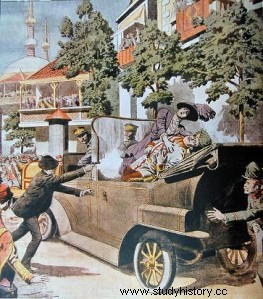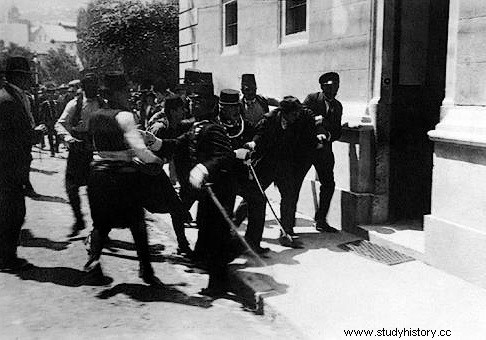 During the Sarajevo attack June 28, 1914 , Archduke Franz Ferdinand, heir to the throne of the Austro-Hungarian Empire, and his wife Sophie are assassinated by the Bosnian student Gavrilo Princip. This double murder comes in a context of strong tensions between the major European powers against a backdrop of rising nationalism. Blamed on Serbia by the Austro-Hungarian government, the assassination of Franz Ferdinand in Sarajevo was the cause of the outbreak of the First World War.
During the Sarajevo attack June 28, 1914 , Archduke Franz Ferdinand, heir to the throne of the Austro-Hungarian Empire, and his wife Sophie are assassinated by the Bosnian student Gavrilo Princip. This double murder comes in a context of strong tensions between the major European powers against a backdrop of rising nationalism. Blamed on Serbia by the Austro-Hungarian government, the assassination of Franz Ferdinand in Sarajevo was the cause of the outbreak of the First World War.
Balkan powder keg
In Europe, the great powers created different alliances. However, nations like Russia and Austria-Hungary have claims to the Balkan region, which was long part of the Ottoman Empire. Since 1830, some Balkan peoples have risen up and won their independence at the expense of the Turks. This is the case of Greece, which obtained its autonomy thanks to the support of Europe. At the Congress of Berlin in 1878, the Ottoman Empire lost all its Balkan possessions, except Thrace.
As a result, two new countries are created, Serbia and Romania, and a new autonomous province, Rumelia, is born. Thessaly is attached to Greece and Russia integrates the regions of Kars, Batum and Ardahan. Austria-Hungary administers Bosnia-Herzegovina and England receives the island of Cyprus. Nevertheless, the unstable climate persists in the region.
Nationalisms were increasingly exacerbated and, until 1908, the Austro-Hungarian Empire and Russia fought over certain territories. Thus, Bosnia-Herzegovina, made up of Serbs and Slavs, was definitively annexed by Austria-Hungary in 1909. The Serbs, dissatisfied, remained powerless, but the Russians, their allies, interpreted this annexation as an insult. The situation therefore becomes confusing. The different countries or provinces invaded each other, which successively caused two wars in the heart of the Balkans, the first in October 1912 and the next in June 1913.
 Serbia eventually emerges victorious from these conflicts and becomes more powerful. In Austria-Hungary, Emperor Franz Joseph has an ambitious heir, Archduke Franz Ferdinand, his nephew. The latter believes that the Austro-Hungarian Empire must occupy a prominent place in the Balkans and put an end to the claims of Serbia.
Serbia eventually emerges victorious from these conflicts and becomes more powerful. In Austria-Hungary, Emperor Franz Joseph has an ambitious heir, Archduke Franz Ferdinand, his nephew. The latter believes that the Austro-Hungarian Empire must occupy a prominent place in the Balkans and put an end to the claims of Serbia.
The Sarajevo bombing
Nephew of the Emperor of Austria-Hungary, Francis-Joseph I, Francis-Ferdinand becomes heir to the crown, following the suicide of Archduke Rudolf. He quickly intervenes with authority in the affairs of the Empire. He took charge of the command of the army, of which he became Inspector General in 1913. He multiplied diplomatic steps with Russia and showed himself favorable to the Slovenian, Croat and Bosnian communities in order to impose Austrian supervision on them. This attitude embarrasses the Serbs who plan to reconstitute a Greater Serbia.
In June 1914, François-Ferdinand, accompanied by his wife, left for Bosnia and Herzegovina to inspect the troops. Serbian extremists do not accept this visit and plan to assassinate him on June 28 in Sarajevo. The procession of the Archduke is insecure and a first failed attack disrupts the party. A first conspirator threw a bomb on the car conveying the Archduke and his wife. He fails and commits suicide, but François-Ferdinand does not seem moved by this incident. He delivers a speech at City Hall. A few hours later, a Serbian student, Gavrilo Princip, kills François-Ferdinand and his wife with revolver shots.
 An Austrian subject of Bosnian origin, Princip belongs to the group La Jeune Bosnia which calls for equal rights for Slavs in the Empire. As he went to Serbia with his accomplices in order to obtain weapons, the Austro-Hungarian government sees this as proof of collusion with the Black Hand, a Serbian organization. We do not know if it was really this group that fomented the attack, but Austria-Hungary is using this as a pretext to weaken Serbia and impose very harsh demands on it. Serbia accepts all the conditions except for the arrival of Austrian investigators, which forces Austria-Hungary to cut all diplomatic ties and leads it to declare war on Serbia.
An Austrian subject of Bosnian origin, Princip belongs to the group La Jeune Bosnia which calls for equal rights for Slavs in the Empire. As he went to Serbia with his accomplices in order to obtain weapons, the Austro-Hungarian government sees this as proof of collusion with the Black Hand, a Serbian organization. We do not know if it was really this group that fomented the attack, but Austria-Hungary is using this as a pretext to weaken Serbia and impose very harsh demands on it. Serbia accepts all the conditions except for the arrival of Austrian investigators, which forces Austria-Hungary to cut all diplomatic ties and leads it to declare war on Serbia.
The alliance game
In the context of the various alliances established by the great powers, this declaration of war obliges each country to respect its commitments. Germany, an ally of Austria-Hungary, becomes involved in the conflict. In order to deal with this situation, Nicolas II of Russia decides to mobilize the army. Germany is trying to intimidate him by forcing him to stop military preparations.
On August 1, faced with the Tsar's refusal, she declared war on Russia, then, two days later, on France, an ally of the Russians. Moreover, in order to surprise France, Germany sent its troops to Belgium despite its neutrality. The English government reacts to the violation of Belgian neutrality and opposes Germany.
Towards the Sacred Union in France
In France, the news of the assassination of Archduke Franz Ferdinand does not provoke many reactions. The trial of Henriette Caillaux, murderer of the director of Figaro, Gaston Calmette, fascinates the crowd. The departure of Poincaré and the President of the Council Viviani for a ceremonial visit to Russia reassures the most worried. Austria-Hungary declares war on Serbia during the trip and, until July 29, the French must react and make a decision in the absence of these two important men.
Finally, Poincaré and Viviani return to Paris after reassuring Nicholas II of Russia about their engagement. During this period of uncertainty, public opinion demanded war to avenge the humiliation suffered in 1870 and prevent the Germans from entering France. In this context, a Sacred Union is formed, a term taken from Poincaré's speech on August 4. It is about the reunion of all French people, left and right, in a single patriotic impulse. Divisions forgotten, all are preparing for a short conflict... It will be otherwise.
